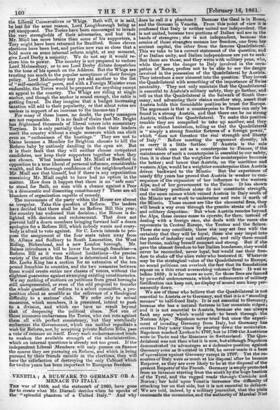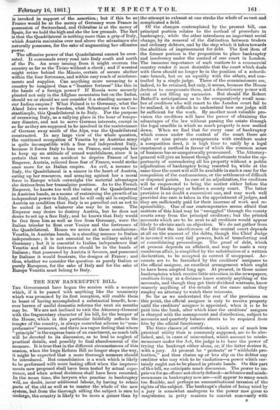VENETI.A. ; A BULWARK TO GERMANY OR A MENACE TO
ITALY. TUB war of 1859, and the statecraft of 1860, have gone far to create what Mr. Disraeli derides when be speaks of the "splendid phantom of a United Italy." And why
does he call it a phantom ? Because the Gaul is in Rome, and the German in Venetia. From this point of view it is confessed that Italy is neither united nor independent. She is not united, because two portions of Italian soil are in the hands of strangers ; she is not independent, because the armies of those strangers menace her freedom, one from her ancient capital, the other from the famous Quadrilateral. This we take to be a correct statement of the question, and if so Italian unity, and Italian independence are yet to seek. But there are those, and they write with military pens, who, while they see the danger to Italy involved in the occu- pation of Rome, profess not to be able to see the danger involved in the possession of the Quadrilateral by Austria. They introduce a new element into the question. They invest the Quadrilateral with something of the importance of Swiss neutrality. They not only maintain that the Quadrilateral is essential to Austria's military safety, they go farther, and : tell us that the Quadrilateral is the bulwark of South Ger. - many, and advancing their claims another step, assert that , Austria holds this formidable position in trust for Europe. The argument is that a counterpoise to France can only be found in a strong Austria, and that there can be no strong Austria, without the Quadrilateral. To make this position tenable they are compelled to take up another, and they do so without hesitation, telling us that the Quadrilateral is " simply a strong frontier fortress of a foreign power," which "does not threaten the real strength and liberty of Italy." Before meeting the argument directly, let us carry it a little further. If Austria is the sole power which can act as a counterpoise to France, if the maintenance of such a counterpoise is essential to our safety, then it is clear that the weightier the counterpoise becomes the better ; and hence that Austria, on the maritime and western Alps, would be a weightier counterpoise than Austria, driven backward to the Mincio. But the experience of nearly fifty years has proved that Austria is weaker in con- sequence of the expansion of her influence to the western Alps, and of her government to the Ticino. It has shown that military positions alone do not constitute strength, and the same causes which ruined Austria in Italy south of the Mincio are at work to undermine and ruin it north of the Mincio. Those causes are like the elemental fires, they will break a way even through the granite strata of a civil and military despotism. But when Austria recedes beyond the Alps, these causes cease to operate, for then, instead of dealing with a foreign race, she deals with the races she represents in Central Europe, the Teuton and the Sclave. These she may conciliate, these she may set free with the certainty that they will be loyal, these she may impel into the paths of industry and enterprise, and rally them round her throne, making herself compact and strong. But if she gave the utmost freedom to her Italian bondsmen, they would never be reconciled, never loyal, but would use their free- dom to shake off the alien ruler who bestowed it. Whatever may be the strategical value of the Quadrilateral to Europe, no sound politican can overlook the fact that its foundations repose on a thin crust overarching volcanic fires. It was so before 1859; it is far more so now, for those fires are fanned by powerful undercurrents, which no refinements of military fortification can keep out, no display of armed men keep per- manently down.
We are of those who believe that the Quadrilateral is not essential to Austria or to Germany, and that it is a " standing menace" to half-freed Italy. It is not essential to Germany, because she has a natural fortress in her mountain ridges ; and it is not essential to Austria, because she can always flank any army which would seek to break through the Norican Alps. Napoleon never tried but once the experi- ment of invading Germany from Italy, but Germany has, overrun Italy many times by pouring down the mountains. Napoleon reached Leoben in 1797, but in 1799 the Austrians, were in Turin and the Russians in Switzerland. The Qua- drilateral was not then what it is now, but although Napoleon demonstrated its advantages as a defensive position against Germany even as it existed in 1796, he never made it a base of operations against Germany except in 1797. Yet the re- sources of Italy were as much at his disposal after lie became Emperor, as they are ever likely to be at the disposal of the present Emperor of the French. Germany is amply protected from an invasion starting from the south by the huge bastion of the Tyrol, and the rugged roads through Carniola and Norica ; her hold upon Venetia increases the difficulty of attacking her on that side, but it is not essential to defence. We are told, indeed, by a military journalist, that the plain commands the mountains, and the authority of Marshal lel is invoked in support of the assertion ; but if this be so France would be at the mercy of Germany were France in possession of Switzerland, and Gibraltar is at the mercy of Spain, for we hold the high and she the low grounds. The fact is that the Quadrilateral is nothing more than a grip of Italy, which Austria maintains over and above the advantages she naturally possesses, for the sake of augmenting her offensive power. The offensive power of that Quadrilateral cannot be over- rated. It commands every road into Italy south and north of the Po. An army issuing from it might overrun the country as far as the Ticino without a check ; and if worsted might retire behind the Mincio, certain of secure shelter within the four fortresses, and within easy reach of reinforce- ments and supplies. Can anything more menacing to a country be imagined than a "frontier fortress" like this in the hands of a foreign power ? If Russia were securely planted not only in the Affghan mountains but on the Indus, should we or should we not consider it a standing menace to oar Indian empire ? What Poland is to Germany, what the _Aland Isles were to Sweden, what Sebastopol was to Con- stantinople, this Quadrilateral is to Italy. For the purpose of overawing Italy, as a rallying place in the hour of tempo- rary disaster, and not to serve German interests, except in so far as they are supposed to be involved in the maintenance of German sway south of the Alps, was the Quadrilateral constructed. In any large view of the whole question, the continued occupation of Venetia by an Austrian army is quite incompatible with a free and independent Italy, because it forces Italy to lean on France, and compels her to keep up an attitude of armed watchfulness since it is certain that were an accident to deprive France of her Emperor, Austria, relieved from fear of France, would strike once more for an Italian empire. An evil, a menace to Italy, the Quadrilateral is a cancer in the heart of Austria eating up her resources, and arraying against her a moral force in Europe which outweighs the material advantages she derives from her transalpine position. As to the French Emperor, he knows too well the value of the Quadrilateral in Austrian hands, as a means of restraining the growth of an independent power in Italy, and he will only aid in expelling Austria on condition that Italy is so parcelled out as not to be united in fact whatever she may be in name. The Emperor may desire to destroy Austria, but he does not desike to set up a free Italy, and he knows that Italy would be free from him as well as free from Germany, were the Italian tricolor to float over Venice and the fortresses of the Quadrilateral Hence we arrive at these conclusions: Venetia in Austrian hands, is a standing menace to Italian independence ; it is not essential to the military safety of Germany ; but it is essential to Italian independence that Venetia and all its fortresses should be in the hands of Italians ; that possessed by Austria it favours, and possessed by Italians it would frustrate, the designs of France ; and thus, whether we consider the question as purely Italian or purely European, for the sake of Italy and for the sake of Europe Venetia must belong to Italy.































 Previous page
Previous page